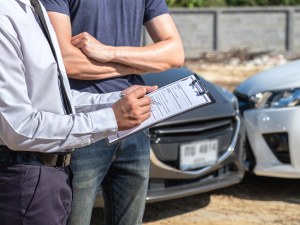request a consultation
Fill out our contact form and we’ll be in touch with you right away.
How to Prove Fault in a Florida Personal Injury Case
If you have recently suffered a personal injury, such a car crash or slip and fall, you’re likely considering legal action to recover compensation for your medical bills. But to achieve a desirable outcome for your case, you will need to prove fault on the part of the responsible party.
In this comprehensive guide, we will discuss the steps you need to take to prove fault and provide helpful insights for anyone seeking compensation in a personal injury case in Florida.
Here’s a tip, one of the best ways to help prove fault in these cases is to contact an experienced personal injury attorney, like our team at Mickey Keenan PA. Contact us today, we’ll fight for you like family.
Understanding Florida’s Comparative Negligence Rule
In the state of Florida, the concept of comparative negligence plays a crucial role in personal injury cases. Comparative negligence means that if you are partially at fault for the accident, your damages will be reduced proportionately to the percentage of your faults. For example, if you are deemed to be 30% at fault, you can only recover 70% of your total damages.
However, this has changed due to HB 837– which amends that a plaintiff is now barred from receiving any recovery if they are more than 50% at fault for their injuries.
This new rule is important to understand because it directly affects your ability to recover compensation. Your goal in proving fault is to demonstrate that the other party was more responsible for the accident than you were, thus maximizing your potential compensation.
Gathering Evidence
The first step in proving fault is to gather evidence. Strong evidence is essential in establishing the other party’s negligence and building a solid case, so it’s important to document the scene as soon as it is safe to do so. Types of evidence that can be used to prove fault in a personal injury case include:
- Photos and Videos
- Medical Records
- Surveillance Footage
- Vehicle Damage Reports
- Traffic Citations
Read More > Why a Dashcam is Your Best Witness
Witness Testimonies
Witnesses can provide an unbiased account of the events leading up to the accident, and their statements can help to establish the other party’s negligence. Make sure to collect the names and contact information of any witnesses at the scene and consider obtaining written or recorded statements from them.
Expert Testimonies
Experts in various fields, such as accident reconstruction, engineering, and medicine, can provide insight into the factors that contributed to the accident and help to establish the other party’s negligence. A trustworthy attorney, like those on the team here at Mickey Keenan PA, will likely work with these experts to help build a strong case on your behalf.
The Role of the Police Report
In many personal injury cases, the police report serves as a critical piece of evidence. Police officers are trained to assess accident scenes and determine the factors that may have contributed to the collision. Their reports often include valuable information, such as:
- The position of the vehicles
- Weather and road conditions
- Statements from involved parties and witnesses
- Any traffic citations issued
Make sure to request a copy of the police report as soon as possible after the accident. Review the report carefully and discuss any discrepancies with your attorney.
Negotiating with Insurance Companies
In many personal injury cases, the at-fault party’s insurance company will be involved in the settlement process. Insurance companies are notorious for trying to minimize payouts and may attempt to downplay the extent of your injuries or place the blame on you.
It shouldn’t come as a surprise that the new HB 837 laws were largely backed by insurance companies.
It’s essential to have a skilled attorney on your side during negotiations to protect your rights and ensure you receive a fair settlement.
New Laws Have Changed the Statute of Limitations
In Florida, the statute of limitations for personal injury cases has been changed. Previously, it was four years from the date of the accident. However, on March 30, 2023, Governor DeSantis signed House Bill (HB) 837, Civil Remedies, which makes several significant changes to Florida’s civil justice system.
HB 837 contains a reduction in the statute of limitations for general negligence cases from four years to two years. This means that if you’ve been injured in an accident, you now have only two years from the date of the accident to file a lawsuit against the party responsible.
HB 837 isn’t just about the statute of limitations; it also places severe limits on what people can sue for. Read about these important changes in the blog below.
Learn More > What New Laws in Florida Mean for Your Injury Case
Proving Damages
In addition to proving fault, you must also establish the extent of your damages. Damages in a personal injury case can include medical expenses, lost wages, pain and suffering, and other losses related to the accident.
In addition to documenting the scene of the accident, you also must document all of your expenses and losses throughout your recovery.
Injured? Lean on the Support of Mickey Keenan P.A.
Proving fault in a personal injury case can be a complex and challenging process. By understanding Florida’s comparative negligence rule, gathering strong evidence, and working with an experienced attorney like Mickey Keenan PA, you can increase your chances of successfully proving fault and recovering the compensation you rightfully deserve.
If you have been injured due to someone else’s negligence, contact our dedicated team today for a free consultation – reach us any time at 813-871-1300. Here, your fight is our fight.



